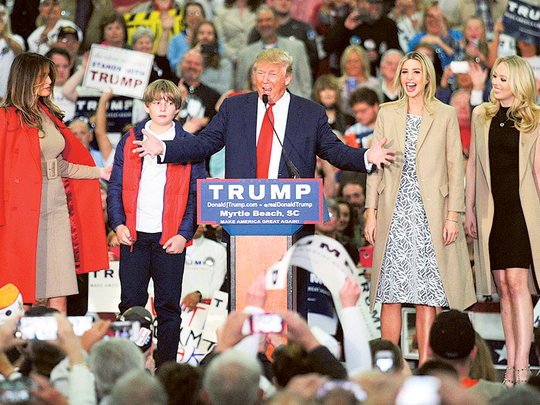
Washington: Donald Trump pledged to bomb the, uh, stuffing out of Daesh.
Sen. Rand Paul called any proposed trade-off between safety and liberty nothing but “bull,” before adding a syllable.
Even Jeb Bush, the stern patrician of the Republican race, has shown a growing fondness for some gentler four-letter words, at times adding them to prepared remarks that had called for something meeker.
“We’re Americans, damn it!” he shouted recently at a New Hampshire barbecue, although no one had suggested otherwise.
A little more than two months before the voting begins, the candidates have charged into what appears to be the inaugural profanity primary, wrought by an overstuffed field of competitors vying for attention and the spectre of a foul-mouthed Manhattanite perched comfortably atop the polls.
The reasons for saltiness seem varied — a play for machismo, perhaps, particularly as national security becomes a chief focus, or a signal of vitality, energy, rawness, a willingness to break through the din. Across both parties, female candidates in the race — Carly Fiorina and Hillary Rodham Clinton — have little reputation for using such language.
“Are you allowed to use profanity?” Paul asked, after doing so November 19, to raucous cheers during remarks at George Washington University.
It would appear so.
Yet the outbursts make clear the extent to which Trump, the election’s clear pacesetter in vulgarity, continues to dictate the tenor of the race. (Although in recent days, his most provocative remarks, by most accounts, have been perfectly printable — like claiming, against all evidence, that he saw thousands of Muslims in New Jersey celebrating the September 11, 2001, terrorist attacks in New York.)
Candidates hoping to outswear Trump are almost certainly overmatched. He has appraised the friendship between Bush and Sen. Marco Rubio as “political b.s.,” without abbreviating, and twice told an Ohio crowd “you bet your [expletive]” he would revive the interrogation technique known as waterboarding.
A recent interview about Trump’s Twitter habits ended with this warning: “Treat us fairly,” he said. “Otherwise I’ll tweet the” — er, daylights — “outta you.”
Trump’s advisers see his influence in his rivals’ choice of words, noting Paul’s expletive this month and a subsequent email to supporters using that word.
“Rand totally admires and worships Mr. Trump and copies anything he says,” Corey Lewandowski, Trump’s campaign manager, said in an email. (“Claiming Rand is imitating Trump? Now that’s really” — ahem, a farce — retorted Doug Stafford, Paul’s main adviser, who in fact repeated the out-of-bounds noun his boss had used at GWU.)
There have, of course, been indecorous moments in presidential politics before. George W. Bush, on the trail in 2000, was caught swearing into a live microphone while assessing a reporter from The New York Times. Sen. John McCain, the 2008 Republican presidential nominee and a Navy veteran, could be quite coarse when speaking to reporters covering his campaign.
And this election season was robbed of perhaps its most colourful imprecatory prospect when Vice-President Joe Biden decided against a run. (His masterpiece: calling the president’s health care law a “big deal,” with a two-syllable modifier in between, during what he thought was a private aside.)
But those moments became public by accident. Such frequent, deliberate cursing by presidential candidates addressing campaign audiences in this election cycle seems to be without modern precedent. It is a striking departure for a party whose 2012 nominee, Mitt Romney, let fly expressions like “H-E-double-hockey-sticks” when he wanted to be puckish.
Republican officials have strained to adjust, questioning whether the moment will last.
“He does it because he needs attention and can’t control himself,” Stuart Stevens, who was Romney’s chief strategist, said of Trump. “Both are not qualities in demand in a president.”
Some candidates seem to relish the shift in decorum. When Trump offered his colourful assessment of the Bush-Rubio relationship in September, Bush was asked to respond generally to the slight.
“I will not answer that question until I hear exactly what he said and the terminology he used,” Bush said, feigning a dodge until the reporter, Dana Bash of CNN, obliged.
“I just wanted to hear it,” he said with a smirk.
The language has posed a complication, though, for news organisations. Generally, style guidelines dictate that obscenities should not be printed unless the precise words are newsworthy.
A bleepworthy candidate Bush, for instance, would not be afforded such a literal rendering. But a President Bush? Hot damn.












